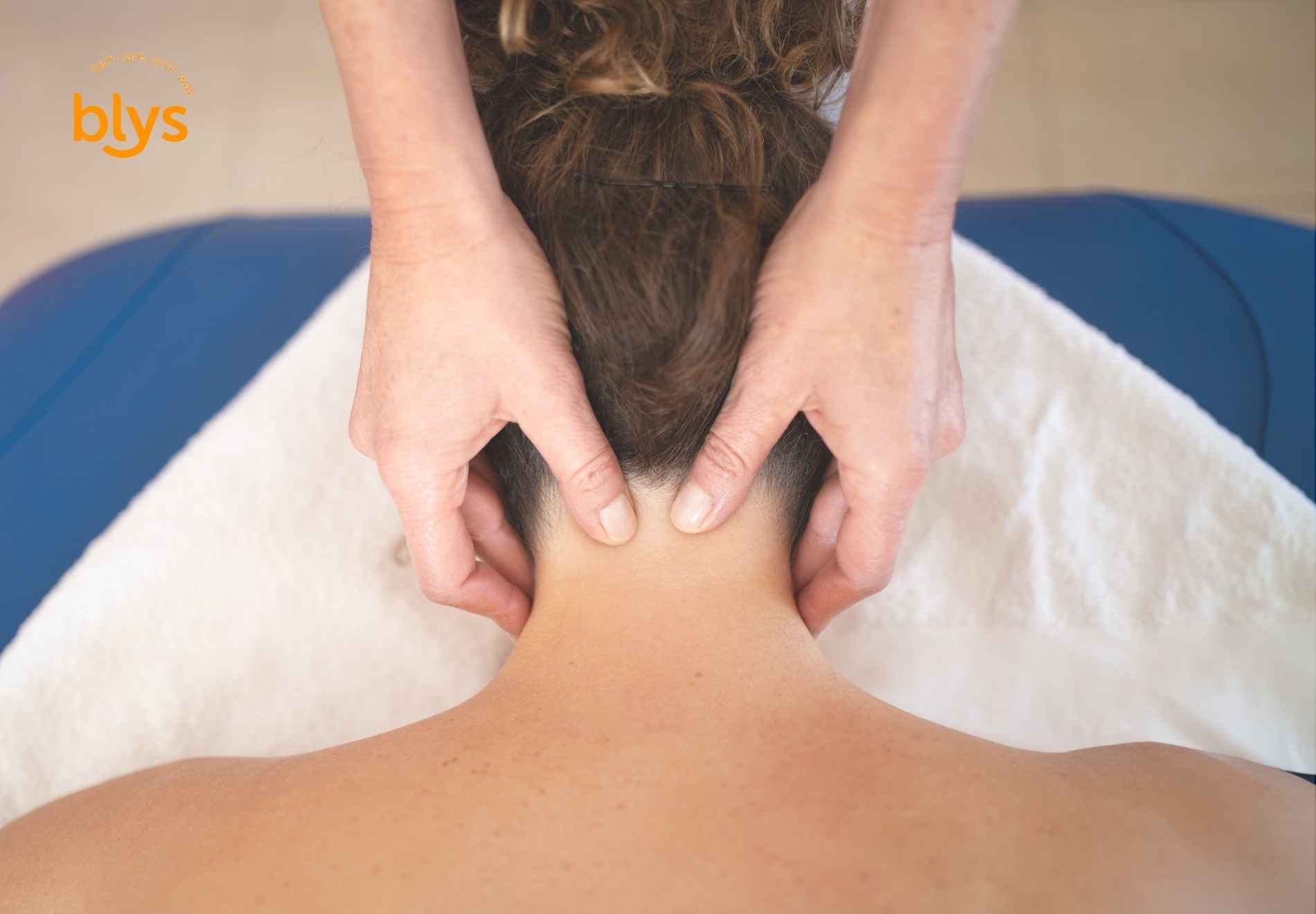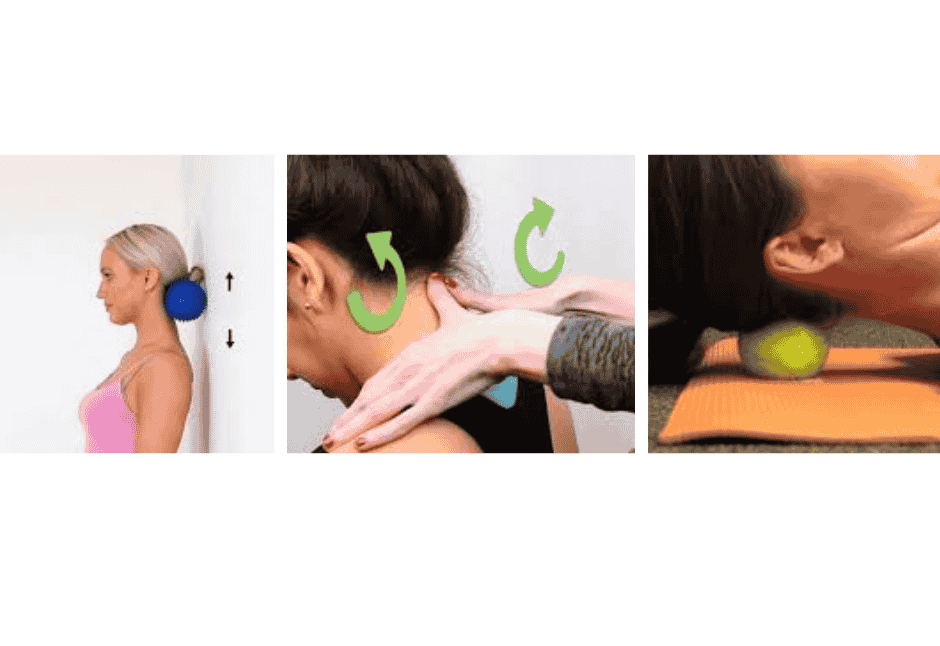
What are Trigger Points in Neck Pain?
Trigger points are basically when a specific area on a shoulder muscle gets irritated and tightens up into a ball or knot. It can cause ongoing muscle pain that may radiate to other areas, limit mobility, and lead to discomfort during everyday activities, making it difficult to perform tasks such as turning the head, looking up or down, or even resting comfortably.
For a detailed guide on trigger point massage, check out our blog on What is Trigger Point Massage?
How Trigger Points Contribute to Neck Pain
Trigger points in the neck and shoulder muscles can lead to discomfort at the base of the skull, often radiating pain down the neck and into the shoulders. There are various factors that leads to neck pain.
| Factor | Description |
| Repetitive Strain | Engaging in repetitive activities (e.g., typing, smartphone use) can strain muscles. |
| Sedentary Lifestyle | Prolonged inactivity or poor posture can weaken muscles and lead to trigger points. |
| Emotional Stress | High stress levels can cause muscle tension, particularly in the neck and shoulders. |
| Inadequate Sleep | Poor sleep quality or awkward sleeping positions can increase muscle tightness. |
| Dehydration | Insufficient hydration can impair muscle function and recovery, leading to trigger points. |
Common Trigger Points Causing Neck Pain
According to Alleviate Pain Clinic, the following are the trigger points that cause neck pain, and the right trigger point therapy helps alleviate the pain.
Trapezius Trigger Points
This large muscle extends from the back of the neck to the shoulders and upper back. Trigger points here can cause neck and shoulder pain.
Sternocleidomastoid Trigger Points
Located on the front of the neck, trigger points in this muscle can lead to headaches and pain in the jaw or ear.
Levator Scapulae
This muscle helps lift the shoulder blade and can contribute to neck pain and stiffness when trigger points are present.
Splenius Muscles
These muscles are located at the back of the neck and can cause pain that radiates to the back of the head.
Benefits of Trigger Point Massage for Neck Pain
Pain Reduction Through Trigger Point Therapy
Trigger point therapy is a highly effective method for alleviating neck pain by applying direct pressure to specific trigger points. This technique helps to loosen tight, fibrous muscles that contribute to discomfort. With the right massage therapist, you can achieve an immediate pain relief with trigger point therapy.
Improved Neck Mobility and Flexibility
Trigger point therapy is specifically designed to release deep-seated tension within the neck and back muscles. This release is crucial for enhancing muscle flexibility and increasing overall mobility. Stiff muscles can severely limit movement, but through the application of massage techniques, these muscles can be elongated and stretched, resulting in better posture.
Enhanced Blood Circulation for Faster Healing
One of the primary benefits of trigger point massage is the improvement of circulation in areas affected by tightness. By applying targeted pressure to specific muscle knots, this therapy promotes blood flow, which is essential for healing and recovery. Improved circulation not only alleviates pain but also nourishes the muscles, facilitating better overall function.
Techniques for Performing Trigger Point Massage for Neck Pain
Professional Trigger Point Therapy for Neck Pain
There are three steps in achieving a professional trigger point therapy for neck pain.
| Step | Description |
| Identifying Trigger Points | A trained therapist will assess the neck and surrounding areas to locate trigger points that may be contributing to pain and discomfort. |
| Applying Targeted Pressure | Using various techniques, the therapist applies sustained pressure to the identified trigger points. This pressure helps to release muscle tension and improve blood flow to the affected areas. |
| Facilitating Muscle Relaxation | As the trigger points are treated, the surrounding muscles begin to relax, leading to a reduction in pain and an increase in mobility. |
For a professional trigger point massage at your convenience, check out Blys and book a mobile trigger point massage session now!
Self-Massage Techniques for Neck Trigger Points
Here is a quick video from Dr. Andrea Furlan on how to do the self-massage technique for neck pain.
Here are some quick techniques to relieve neck pain at home.
| Techniques | Description |
| Finger Pressure Technique | Locate trigger points and apply firm pressure for 10-30 seconds. |
| Thumb Massage | Use thumbs to apply circular motions on either side of the neck. |
| Palm Press Technique | Press palm on the back of the neck and slide down towards shoulders. |
| Neck Stretch and Massage | Tilt head to one side and massage the opposite side while holding the stretch. |
| Foam Roller Technique | Lie on a foam roller and gently roll head back and forth. |
| Tennis Ball Massage | Roll a tennis ball against the wall to target specific trigger points. |
 When to Seek Professional Help for Neck Pain
When to Seek Professional Help for Neck Pain
Neck pain can often be a common issue, but certain symptoms may indicate a more serious underlying condition that requires professional medical attention. According to HSS | Hospital of Special Surgery, if you experience any of the following signs, it is important to seek help promptly.
- Muscle Weakness: Pain associated with muscle weakness in the arms or legs.
- Bowel or Bladder Issues: Pain accompanied by loss of bowel or bladder function.
- Clumsiness or Falling: Sudden onset of clumsiness and/or falling.
- Weight Loss: Unexplained weight loss alongside neck pain.
- Radiating Pain: Severe pain that radiates down the arms or legs when you move.
- Extreme Instability: Sudden ability to tilt your head forward or back much farther than usual, indicating a possible fracture or torn ligaments.
- Post-Accident Pain: Neck pain stemming from a serious issue, such as a car accident, requiring immediate medical treatment.
- Systemic Symptoms: Neck pain accompanied by fever, vomiting, headaches, and sensitivity to bright lights, necessitating immediate medical attention.
- Persistent Pain: Severe neck pain that is worsening or has persisted for more than a few weeks.
- Neurological Symptoms: Experiencing radiating pain, numbness, tingling, and/or weakness.
Final Thoughts: Relieving Neck Pain with Trigger Point Massage
Trigger point massage effectively alleviates neck pain by targeting specific muscle knots that cause discomfort. This therapy can lead to significant pain relief and improved mobility, whether performed by a professional or through self-massage techniques. Incorporating trigger point therapy into your routine can enhance overall well-being, but it’s important to seek professional help if symptoms persist.
Frequently Asked Questions (FAQs)
Can I Perform Trigger Point Massage on My Neck Myself?
Yes, you can perform trigger point massage on your neck yourself using your fingers or a massage tool, but be gentle to avoid injury.
How Often Should I Do Trigger Point Therapy for Neck Pain?
It is generally recommended to perform trigger point therapy 2-3 times a week, increasing frequency if experiencing acute pain.
Are There Any Risks Associated with Trigger Point Massage?
Risks include bruising, soreness, and potential nerve irritation, especially if pressure is applied incorrectly.
How Long Does It Take to Experience Relief from Neck Pain?
Relief can vary. Some may feel immediate improvement, while others might need several sessions over days or weeks for significant relief.





